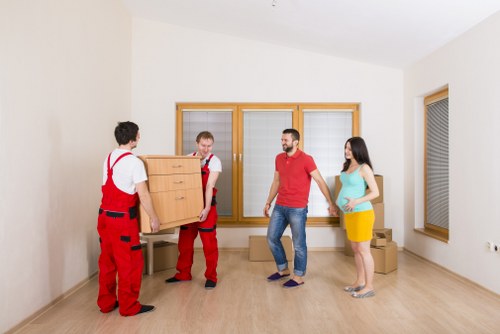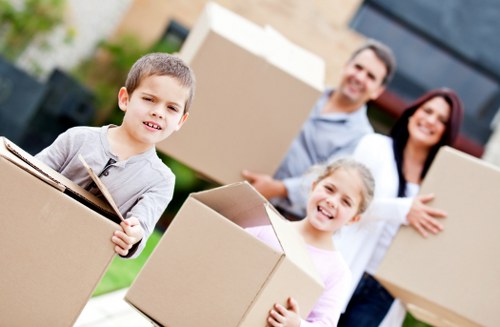Comprehensive Guide to Council Rubbish Collection in North London

Introduction to Council Rubbish Collection
Managing waste is a crucial aspect of maintaining a clean and healthy environment in North London. Council rubbish collection services ensure that households and businesses dispose of their waste responsibly, promoting sustainability and reducing environmental impact. Understanding how these services work can help residents make the most of the available resources.
North London comprises a diverse range of neighborhoods, each with its unique characteristics and waste management needs. The council works diligently to provide tailored rubbish collection services that cater to these varying requirements, ensuring efficiency and effectiveness across the board.
In this guide, we will explore the ins and outs of council rubbish collection in North London, covering topics such as collection schedules, types of waste accepted, recycling programs, and tips for minimizing waste output.

Rubbish Collection Schedules and Procedures
One of the primary aspects of council rubbish collection is understanding the schedules and procedures in place. North London councils typically operate on a weekly or bi-weekly collection schedule, depending on the area and the type of waste.
Residents are usually provided with specific collection days for different types of waste, such as general rubbish, recycling, and garden waste. It's essential to adhere to these schedules to ensure that waste is collected promptly and efficiently.
Failure to follow the designated procedures can result in missed collections or fines. Therefore, staying informed about your local collection schedule and any changes is vital for smooth waste management.

Types of Waste Accepted
Understanding what types of waste are accepted by the council is crucial for effective rubbish disposal. Generally, council rubbish collection in North London accepts the following categories:
- General Waste: Non-recyclable items that cannot be composted or processed through other recycling streams.
- Recyclable Materials: Items such as paper, cardboard, glass bottles, and certain plastics that can be recycled.
- Garden Waste: Organic waste like leaves, branches, and grass clippings.
- Bulky Items: Large items such as furniture and appliances, usually collected on specific days or through special arrangements.
- Hazardous Waste: Items like batteries, chemicals, and electronic waste that require special disposal methods.
Properly sorting your waste ensures that recyclable and compostable materials are processed correctly, reducing the strain on landfill sites and promoting environmental sustainability.

Recycling Programs and Initiatives
North London councils are committed to promoting recycling and reducing waste through various programs and initiatives. These efforts aim to encourage residents to participate actively in waste reduction and resource recovery.
Key recycling initiatives include:
- Kerbside Recycling: Residents can place recyclable materials in designated bins for collection on scheduled days.
- Recycling Centers: Accessible facilities where residents can drop off larger recyclable items or materials not accepted in kerbside collections.
- Educational Campaigns: Programs designed to inform and educate the public about the importance of recycling and how to do it correctly.
- Incentive Schemes: Rewards for households and businesses that actively participate in recycling programs.
By participating in these programs, residents contribute to a more sustainable North London, reducing the environmental footprint and conserving valuable resources.

Minimizing Waste Output
Reducing the amount of waste generated is a fundamental step toward sustainable living. North London councils provide various resources and guidelines to help residents minimize their waste output.
Effective strategies include:
- Reusing Items: Finding new uses for items instead of discarding them.
- Composting: Turning organic waste into nutrient-rich compost for gardening.
- Purchasing Wisely: Choosing products with minimal packaging and those made from recyclable materials.
- Repairing Rather Than Replacing: Fixing items to extend their lifespan instead of buying new ones.
Implementing these practices not only reduces the burden on waste management systems but also fosters a culture of sustainability within the community.

Nearby Areas Covered by North London Council Rubbish Collection
North London's council rubbish collection services extend to several nearby areas, each benefiting from tailored waste management solutions. Here are some of the closest areas:
- Hampstead: Known for its picturesque streets and green spaces, Hampstead residents enjoy regular rubbish collection and access to comprehensive recycling facilities.
- Barnet: This bustling area offers flexible waste collection options, including bulky item pickups and specialized recycling programs.
- Enfield: With a strong emphasis on community participation, Enfield provides educational resources on waste reduction and recycling.
- Islington: Urban living in Islington is supported by efficient waste collection services and numerous recycling initiatives.
- Camden: Camden's vibrant community benefits from extensive waste management services, including hazardous waste disposal options.
- Tottenham: Tottenham offers robust rubbish collection schedules and convenient recycling drop-off points.
- Highgate: Highgate residents have access to regular waste collection and are encouraged to participate in composting programs.
- Finsbury Park: This area features organized waste collection and innovative recycling solutions tailored to its diverse population.
- Wood Green: Wood Green prides itself on its proactive approach to waste management, including community-driven recycling projects.
- Westminster: Although partially overlapping with central London, Westminster's northern parts receive dedicated rubbish collection services from North London councils.